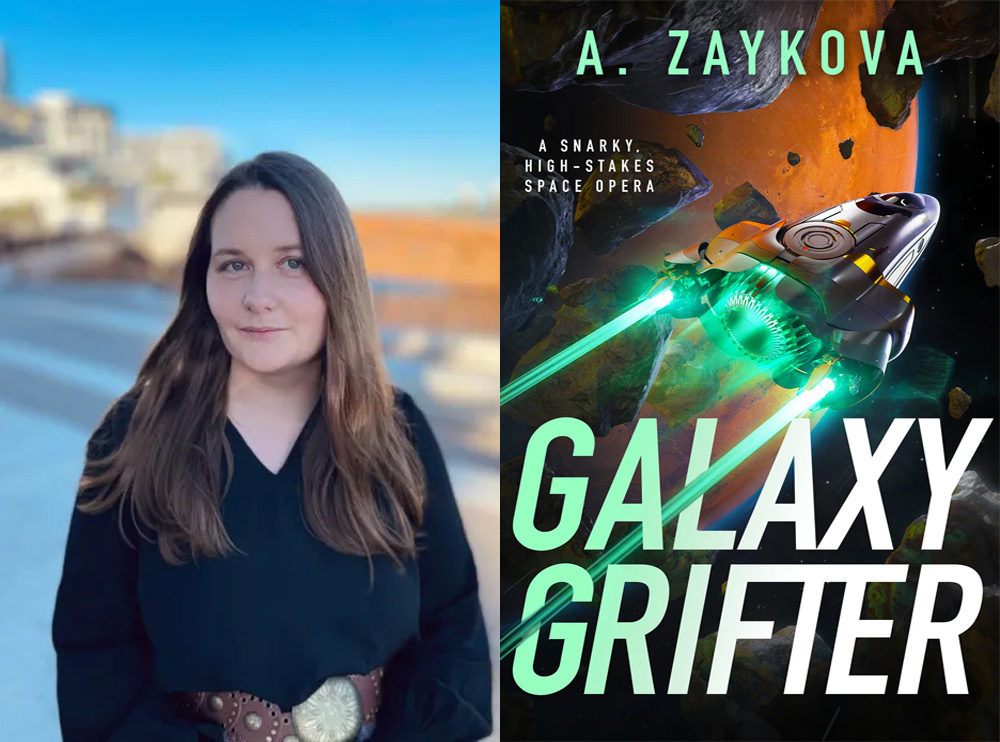Guest post written by Galaxy Grifter author A. Zaykova
A. Zaykova loves to explore the deepest corners of faraway galaxies and of the human psyche alike. As a second generation science fiction geek, she always liked to escape into imaginary worlds and has been writing for as long as she could hold a pen and storytelling since before then. Growing up as a global nomad, she spent most of her adult life in New Zealand, where she earned a bachelor’s degree in communication and spent a decade writing and managing media for central government. She currently lives in Australia with her husband, daughter and rescue cat.
About Galaxy Grifter (out now): To get his ship back, a con artist swindles an alien blueprint to sell. But the programmer he hires to decode the data has plans of her own. When the job goes sideways, they’re forced to run, outwit ruthless adversaries, and stay one step ahead to survive. Along the way, they uncover a sinister secret behind the blueprint that could destroy humanity. In a galaxy full of betrayal, trust is a luxury they can’t afford.
Let’s face it, most of us need an escape from reality from time to time. Whether we’re fatigued by the state of the world or personal problems, sitting down with a good book (or film) can feel like a well-deserved holiday for a tired mind. I’m definitely no exception.
Science fiction and fantasy books have helped me through some pretty rough patches. My debut novel, Galaxy Grifter, was born for the same reason: it gave me a place to go when grief, stress, and burnout felt like too much to handle.
But why is it that instead of reaching for cosy, idyllic and hopeful stories, I keep coming back to gritty space opera? Let’s unpack that.
While critics may label adventure stories as trivial or immature (even Stevenson and Tolkien weren’t immune), research increasingly supports what readers, viewers, and gamers have known all along: escapism is a vital tool for mental well-being. It helps with stress relief, emotional regulation, and offers new perspectives. It also fosters a sense of connection and belonging through fandoms and communities.
Escape looks different for different people. Some want idealised love stories, others a glimpse into the lives of the rich and famous, haunted houses, magical kingdoms, heists, or revenge. But at its core, escapist fiction offers “distraction and relief” from ordinary life. It needs to feel different and immersive—but not necessarily light or cosy.
In fact, most readers enjoy a good thrill. Research shows that engaging with fictional danger activates the brain’s reward system, including dopamine release, which can relieve stress and improve mood. So, reading about hurtling through an asteroid field while dodging laser beams isn’t just more exciting than thinking about taxes and work deadlines. It’s also, in a very real sense, calming.
Importantly, escapism doesn’t follow neat moral lines. Stories increasingly let ordinary people live vicariously through criminals (whether it’s Ocean’s 11 or Six of Crows). People root for the bad guy because the bad guy flips off the system, but also, because cool and savvy criminals provide a relief from social awkwardness. Bad guys don’t lie awake at night wondering if they rambled too long in a meeting. Not most of them, anyway. So, charming outlaws with just enough humanity to make them relatable strike a chord.
Historically, adventure literature took place on ships navigating uncharted seas, in the lawless outposts of the Wild West, or deep in unexplored jungles. But by the 20th century, the seas had been charted and the West tamed. So, literary thrill-seekers turned their gaze to the stars. Jules Verne and H.G. Wells were some of the first in the West to write about it. But to this day, space holds the most mysteries—and within them, our deepest hopes and fears. That’s why exploring the galaxy can feel like the ultimate escape.
Space opera was born in pulp magazines printed from the 1920s onward, but its popularity boomed in the 1940s and ’50s. Published after the Great Depression, against the backdrop of World War II and the looming threat of nuclear war, these stories leaned into the grit and contradictions of their time—both in the kinds of societies they imagined and the kinds of protagonists they followed.
Take A.E. van Vogt’s The Weapon Shops of Isher (1951), set in a corrupt interplanetary empire challenged by mysterious weapon shops that exist to safeguard individual freedom. It’s an allegory built on the idea that if everyone carried firearms, they could resist authoritarian control—a concept that still permeates American cultural mythology.
In Harry Harrison’s Stainless Steel Rat series (starting in 1961), the con artist protagonist “Slippery Jim” diGriz has flexible morals and no noble cause. His motto is “live to grift another day,” and he justifies his crimes as public entertainment. He turns to fighting crime not because he learns the error of his ways, but because he’s out-conned and forced to work for the Special Force.
From the ’60s onward, as the West rebuilt itself, space opera took a more defined turn toward the mainstream—and with it, toward optimism. Human rights became a popular topic, and manned spaceflight was no longer a fantasy.
In addition, the Hays Code, which regulated the content of Hollywood productions at the time, prevented any content that could “lower the moral standards of viewers” from appearing in film. This meant, for example, that authority figures had to be portrayed respectfully, and criminal activity had to be punished and under no circumstances illicit sympathy.
Although replaced in 1968, it continued to have a huge impact on film and TV production and by extension, on storytelling at large. Star Trek (1966) imagined a post-scarcity, post-racist future led by diplomacy and curiosity. Star Wars (1977) offered a revolution against a totalitarian empire to restore democracy, order, and community. Similarly, Lois McMaster Bujold’s Vorkosigan Saga (1986 onward) used military and political intrigue to explore identity and the limits of power.
So, while these stories offered escape, and certainly pushed some boundaries, they still reinforced existing power structures. Militarism was presented as good—as long as you fought on the “right side.” Government and governance was good—as long as it was the “right kind.” These narratives created an illusion of control: a comforting idea that ordinary people could change the world for the better, if only they subscribed to the correct leaders and causes.
By the late ’90s and early 2000s, the optimism had started to dwindle. Globalisation became the new colonialism—with sweatshops, monopolies, and a widening wealth gap. Advances in communication technology brought concerns about surveillance and alienation. The environment visibly deteriorated. Fear of terrorism and criticism of warmongering for profit intensified. People felt increasingly disempowered.
TV
The Canadian-German series Lexx (1997–2002) combined campy nihilism with body horror, as a crew with haunted pasts navigated the “dark universe.” Cowboy Bebop (1998, Japan) followed a cast of broken characters in a dying world with no noble cause to rally behind. It brought the genre back to its pulp roots—fatalism, loneliness, and the sense that the fight was lost. Firefly (2002, US), in contrast to Star Wars, asked what happens after the war is over and you were the losing side. It explores the dynamics of a crew who’d lost their “great cause” and all that’s left is survival on the fringes.
Interestingly, none of these shows were huge hits out of the gate. Lexx was deemed weird and aired late at night. Firefly was cancelled after one season. Cowboy Bebop originally aired only 12 of its 24 episodes in Japan. But all gained cult status over time and became unspoken benchmarks for gritty space opera.
Books
Found families—often spaceship crews—became a hallmark of the genre. Writers realised that people are more likely to rally behind individuals they care about (based on shared values and experience) rather than noble causes or formal structures.
This is evident in Leviathan Wakes (The Expanse series by James S. A. Corey, 2011), when Holden refuses to sacrifice the lives of his crew on Rocinante to keep tracking Eros Station—even if his refusal could doom humanity.
Becky Chambers’ The Long Way to a Small, Angry Planet is marketed as cosy space opera, but the cosiness only exists due to a culture of acceptance and inclusivity created aboard the Wayfarer. The ship acts as a bubble, protecting the crew from the gritty and unjust galaxy beyond, full of war, prejudice, and forbidden relationships. The book doesn’t offer neat solutions.
Revenger by Alastair Reynolds (2016) is almost gothic in its fatalism. Set in a broken star system, it follows a crew of scavengers chasing secrets and vengeance. It sends its protagonists, the Ness sisters, on corruption arcs from naive adventurers to weary smugglers capable of morally compromising decisions.
Galaxy Grifter, my debut foray into space opera, builds on the genre’s pulp roots and later developments without simply replicating what’s being done before. The book doesn’t offer an overt critique of its interplanetary society, although disparities are evident. The main characters are too disenfranchised, disempowered, and preoccupied with their own problems to think about making the world a better place. In fact, the protagonist—a selfish, sycophantic con artist named Levi—might be part of the problem.
Not unlike The Stainless Steel Rat, Levi has no heart of gold and no qualms about using people for his own gain. But instead of playing it off for laughs (although the tone is snarky and deadpan), the story leans into the consequences: how his behaviour affects others, and how it ultimately leads to him becoming increasingly isolated and hunted.
The book also forgoes the found family trope in favour of zeroing in on a fraught and contentious relationship between two individuals. Their forced alliance, laced with betrayal and fatalistic attraction, neither redeems nor heals. It does, however, force the characters to see each other beneath layers of masks and cynicism. And for some, being seen, flaws and all, is more urgent than being fixed.
However, above all that, it delivers on the promise of escape—with fast-paced, high-stakes grifts, twists and chase sequences that will make readers forget about their latest worries, at least for a few hours, without expecting them to suspend their overall world weariness.
Over the past couple of decades, the world has grown increasingly volatile. Capitalism is faltering, wealth inequality is rising, the climate crisis is worsening, and political divisions grow deeper. Certain tech developments, like generative AI, feel more disconcerting than empowering.Promising discerning readers a just cause or a hopeful future can feel like slapping a bandage over a gaping wound. It rings insincere and disrupts the fictive dream escapism relies on.
Grittier narratives meet people where they are. They make readers feel seen in their disillusionment but remind them they still matter. Not because they must change the world or process all their trauma, but because of stubborn survival and unlikely connections with others just as broken. Maybe not in spite of, but because of their flaws.
While similarly disillusioned grimdark fantasy offers alternate histories, and the mass appeal of romantasy offers idealised intimacy, gritty space opera offers a tonally plausible future. It may not be a hopeful one, but, given the current state of disillusionment, the possibility of any future can feel like a win.
In addition to calming nervous systems by hurling readers through the unexplored final frontiers, space opera offers perspective by creating distance from the mundane. And maybe, through moments of awe, connection, and defiance, it convinces audiences that a world that can’t be fixed is still worth surviving in.

